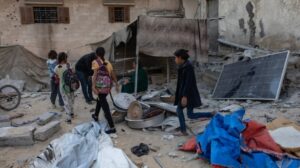Hello, we’ve entered Holy Week and, as you can understand, passions—both religious and political—usually fall silent or at least calm down, especially when the weather promises to be wonderful and everyone is thinking about the… holy five-day break that usually starts on Holy Thursday and ends on Easter Tuesday. Occupancy rates are good, not so much on the islands but in the rest of Greece, airline routes are close to 90% full, Athens and Thessaloniki are highly booked, and the tourist season for foreign visitors has slowly begun. And we say all this because, as those of you who read this column understand, the world doesn’t revolve solely around narrow political news, which, don’t imagine, is anything major at this time when it comes to our domestic affairs. On the contrary, there is always anxiety about the moves being made on the other side of the Atlantic, especially concerning Greek-Turkish relations, because when it comes to the economy, whatever is going to happen… will happen, and for us, without us. And this is known in Athens, although at the moment, at the level of Finance Ministers, the new man in this position, Pierrakakis, is building good relationships with his colleagues in Brussels and is closely monitoring developments related to Europe vis-à-vis the USA.
Maximos Mansion–Chatzidakis
Now, just so we have something to talk and write about during these holy days, I asked how the new setup at the Maximos Mansion is going after the reshuffle, turning to my old, classically reliable source. “We’re in a phase of adjustment, where—to describe it a bit more graphically and perhaps exaggeratedly—Kostis… found a pleasant atmosphere here, which you could liken to a talk show—more like a morning show—between various factions, each of whom would present their own theory. And to think, if it had been the time when Voridis was on one side and Patelis on the other, it would sometimes evolve into a full-blown reality show. What’s happening now is that Kostis (Chatzidakis) is trying to unify the centers and get everyone working together, although he didn’t come here to play the prime minister’s chief of staff—and of course, he doesn’t want to, not at all. After all, how much he didn’t want to come was ‘elegantly’ described in his interview with Evgenidis (protothema.gr). He said, ‘If I had refused the position the prime minister asked me to take at a time like this, when the government isn’t exactly at its best, I would feel like a cowardly little man.’” My source ended the discussion with me by saying: “Anyway, we’re seeing a lot of internal backstabbing and quite a few leaks—something we didn’t even have under Dimitriadis, or under Papastavrou and Bratakos—and this doesn’t help the work at all.” Right, so now I’m hearing all of this. Let me note, since I’ve been doing reporting my whole life, that journalists are just doing their job—so they’re almost never to blame. When you give them news, they’ll write it; that’s their job and their nature. Hence the well-known old saying: “You can never make a friend of a policeman or a journalist.” But I must also point out that when you’re not paying attention to what’s happening inside the party or government, eventually… something falls on you and crushes you. But—to tell the truth—it’s nothing new for various government figures to start measuring their strength, especially near the end of a term; I’ve seen it many times in my career, particularly in center-right governments.
Opposition
Now of course, to tell the whole story, the communications team at the Maximos Mansion is doing just fine, especially during this period and particularly with the Tempi incident… the team’s working overtime, especially Pavlos Marinakis, who has to respond to everything, from everyday small matters to Zoe, whom I heard him telling the other day how… Bibilas and her partner ended up in Parliament and two women got together—something she supports so passionately. Anyway, Zoitsa isn’t being voted for as an alternative pole of power but to… be Zoitsa, meaning herself, so whatever anyone tells her, it doesn’t stick. Where I honestly—without having experience in the world of the Left—can’t grasp what’s going on is within the left itself, where they’re fighting about whether they’ll get along as if they have something to divide… in the sense that there’s not much left. As for PASOK, the historical phrase by the sports commentator Chelakis applies: “I can’t describe this anymore.”
For drinks at “Lykovrysi,” Dendias with 30 “blue” MPs
I had pointed out to you that lately there has been intense activity in the “blue” camp, with secret meetings, public gatherings, drinks, behind-the-scenes discussions, and probing questions. So, I’ve learned from my source, who regularly circles around Kolonaki, that on Friday night, after the parliamentary vote on the findings of the preliminary investigation committee, about 20–30 provincial New Democracy MPs—including Ch. Dermetzopoulos, T. Bartzokas, P. Mantas, Al. Markogiannakis, A. Skondra, F. Baraliakos, G. Pappas, St. Keletsis, and also Deputy Minister of Digital Governance Ch. Boukoros—gathered at “Lykovrysi” for drinks at the invitation of Nikos Dendias. Earlier, the Minister of National Defence, speaking at the Delphi Forum, said that those who believe citizens will vote for ND again merely because there is no alternative governance proposal are mistaken.
Surrogacy and the preparations of…the 50
With the multi-bill from the Ministry of Justice, which blocks same-sex male couples from having children through surrogacy, parliamentary proceedings are expected to begin after the Easter holidays. The same bill will also include provisions to align the law on ministerial accountability with the Constitution so that felony charges against ministers expire after 20 years, just as they do for ordinary citizens, as well as the new framework for pre-trial detention and the imposition of restrictive conditions on defendants after their testimony. Note that many of the roughly 50 ND MPs who disagreed with same-sex marriage are preparing public interventions. They will argue that recent developments vindicated them politically—as seen in the drop in ND’s percentages in the European elections—and institutionally, as the government now seeks to close “back doors” that allow for a surrogate mother industry.
The deal and the plans of P. Nomikos for the Cooperative Bank of Epirus
The matter currently being discussed in the market is the acquisition of the Cooperative Bank of Epirus by Petros (Peter) Nomikos. The shipowner’s negotiations with the Cooperative Bank began—very discreetly—last November and eventually led to the signing of the agreement last Friday. On the shipowner’s side, negotiations were handled by lawyer Sonia Saranti (with a career background in the firms Karatza and Bacha), while on Epirus’s side, apart from CEO Ioannis Vougioukas and the union reps from the Occupational Insurance and Pension Fund for Insurance Employees (“TEA-EAPAE”), legal counsel Dimitris Tsimpanoulis also played a key role, having known the bank well from his previous tenure at the Bank of Greece. The nominal value of the Epirus shares is €0.5, but the shipowner agreed to pay “above par” at €0.6/share and—once Epirus receives approval as a Société Anonyme from the Bank of Greece—during the upcoming Capital Increase, he will pay 100% of the bank’s book value. The agreement includes a €5 million clause in case the due diligence reveals discrepancies in the balance sheet figures. On the other hand, if P. Nomikos’s CapStone Capital backs out of the deal, it is obligated to pay €1 million in “compensation.” And since the Cooperative Bank is now turning to the Bank of Greece to obtain S.A. status, this means the market gains its 7th bank.
Stournaras closed one of the last pending issues
The Governor of the Bank of Greece was in Warsaw for the Eurogroup meetings when he received the call about the signing of the CapStone Capital–Epirus agreement. Yannis Stournaras had been closely monitoring the progress of the negotiations, and the final agreement resolves one of the last three outstanding issues he had set for the completion of his second term. After successfully and impressively resolving the major problem of Attica Bank, the issue of the Cooperative Bank of Epirus is now being settled (which in Epirus is considered “systemic,” as it holds a 10% market share). The remaining two issues concern the Cooperative Bank of Chania (which is struggling with customer lawsuits) and the Cooperative Bank of Thessaly, which is also seeking its own strategic investor to find its path forward.
The ECB is reviewing banks’ dividend strategies
And since the discussion turned to banks, I hope we won’t have any sudden cold showers, because what the head of the SSM, Claudia Buch, told us on Friday noon gave me the impression that the supervisory authority is walking a tightrope in terms of what it will decide to do. Buch announced that she does not intend to impose universal restrictions on dividends (i.e., will she impose selective ones?) despite market turbulence. She said there was an observed increase in margin requirements, but there are no signs of liquidity problems. She added that the impact of trade tensions may take time to manifest and concluded that the ECB is reviewing banks’ distribution strategies.
Developments in ELLAKTOR
The agreement reached last week between the two listed companies, R.E.D.S. of the ELLAKTOR Group and Dimand of Dimitris Andriopoulos, is very significant. Dimand acquired 100% of the respective companies controlling the former Kampa Estates and the old U.S. base in Gournes, Heraklion, Crete. However, it seems that developments at ELLAKTOR will continue. Right after Easter, in the first days of May—according to sources—Motor Oil (which currently controls 22% of ELLAKTOR) will sell another large block of shares to Reggeborgh Invest (which currently holds 52%). Thus, the Dutch (together with the Atlas Fund) will gain control of about 80% or more of ELLAKTOR’s shares. This leads to two options: either the Dutch will sell share packages to institutional portfolios (placement) to ensure the necessary dispersion, or they will proceed with a public offer to delist the stock from the Athens Stock Exchange.
Sunlight: Three factories in America
The story with Trump’s tariffs proved that Panos Germanos’ group has a long-term strategy and has opened cooperation channels. Sunlight, owned by Panos Germanos, has 3 factories in the U.S. that manufacture and assemble industrial batteries. Currently, work is underway to upgrade capacity at some of them, as well as to increase on-site operations in the U.S.
Motor Oil: The price cap and the “good” gas stations
Fuel adulteration remains a huge issue as one in three gas stations is in the hands of non-compliant operators! As Motor Oil’s Deputy CEO Petros Tzannetakis mentioned on Friday at the Hellenic Fund and Asset Management Association, this is a matter the state is obliged to address—not the “irrational” price cap on fuel, as he described it, which was implemented during the pandemic for other reasons, continued during the energy crisis, and remains despite those reasons no longer existing. That’s also the motive behind the group increasing in recent years the percentage of owned and self-operated stations in order to control the fuel quality. In 2010, Shell stations numbered 195, now they are 365, and AVIN had 5–6, now it has 165. As he clarified, “when you get a receipt that mentions the brand Myrtea or Hermes, it means it is owned; and when you go to AVIN and the receipt says Konkart or Makraion, know that Motor Oil is selling you the fuel.” The price cap on profit margins expires at the end of April and the market is waiting to see what the state will do next. Petroleum companies are keeping expectations low, stressing that the suffocation of margins has pushed honest station owners out of the market and flooded it with non-compliant ones! P. Tzannetakis also told analysts that while other countries apply price caps selectively, they do so with strict time limits—not like Greece, which has kept it in place since 2021.
Trump’s…moods guide the Stock Market
The tectonic shifts in global trade and Trump’s flip-flopping on tariffs have driven market volatility to new heights. Indicatively, the Greek stock market moved within a range of about 200 points last week. It came dangerously close to entering a bear market compared to the 15-year high of 1,750 points recorded at the end of last March, as it was down by as much as -16.85% from that milestone. It later recouped some losses, climbing back above 1,650 points and down just -5.5% from the year’s peak, before settling at 1,580 points. As for the banks, they temporarily entered a bear market as well, trading as much as -26.14% below the 9-year record of 1,731 points. The intense instability of the domestic market was accompanied by an average daily turnover of about 288 million euros over the past five days, with investors rushing en masse to buy or sell depending on Trump’s mood and the resulting reactions from the major stock markets.
What happened in Delphi
A few observations. First observation… As we mentioned last Friday, there were noticeably fewer people at this year’s forum—it was obvious to the naked eye. The only ones who increased their presence were the media and cameras, which in recent years have been given special space, in coordination with the organizers, for on-camera interviews; communications companies; and consulting firms that came in “full deployment.” Regarding the media, for the first time, some outlets from neighboring countries appeared with their own stands, not just covering the activity of a particular minister. The business world, however, had quite a few absentees, and from most sectors that have seen significant developments. And this despite the fact there were “new entries,” such as OPAP, whose entire board was present. As for the political scene, the only comment is that although many ministers, MPs, and party officials showed up for the Prime Minister’s speech, the picture was very different compared to last year, when there was literal chaos from government and party members. Then again, you’ll say, last year the Forum took place while we were expecting an imminent cabinet reshuffle, so the interest was of a different kind.
Top spots for Georgiadis and Vettas in the panels
I don’t know if those absences were the reason some representatives from business or government ended up participating in 3, 4, or even 5 panels! I think the attendance record this year was held by Health Minister Adonis Georgiadis, along with IOBE’s General Director Nikos Vettas. Even representatives from Industry, who usually avoid public exposure, ended up joining multiple panels. I counted at least three for Spyros Theodoropoulos and Michalis Stasinopoulos, among others. Still, all participants agreed that this year’s event felt perhaps more “human,” precisely because of the reduced attendance compared to last year. To be fair, part of the reason was logistical—this year the Delphi Cultural Center was closed, so a new spatial layout was needed, concentrating all events at the Amalia Hotel and some surrounding hotels. In that context, I’m told various professional meetings that took place had more breathing room, without the pressure of a suffocating schedule. The only ones pressed for time were those who made the trip to Delphi and back in a single day—an increasingly common phenomenon.
The 40 SEV companies with business in Defense
At this year’s Forum, while the main theme dominating discussions was American policy, the trade war, its broader implications, and Greece’s position in all this, the real “business” talk revolved around the money flowing into Defense! Suddenly, beyond the usual well-known names, many began to appear claiming they had some activity in the Defense sector. A telling comment came from Spyros Theodoropoulos, who noted that in a recent meeting at SEV on the matter, 40 companies showed up, the overwhelming majority of which had been “hiding” their involvement because it clashed with ESG standards! In any case, entrepreneurs and executives from the sector were in Delphi as early as Wednesday, including Christos Chatziminas of Theon and EFA Ventures, Miltiadis Varvitsiotis representing the Skaramangas shipyards, Panos Xenokostas of ONEX, Papadopoulos of Lockheed, and Diakopoulos of HAI, all of whom were among those invited to publicly speak on defense spending in Saturday’s panels. Let’s not forget, there are four defense investments “cooking” involving major business players.
Nikos Stathopoulos: “Everyone was asking whatever they wanted”
Elsewhere, most new deals are likely to be put on hold for about a month until the business world gets a better sense of where things are headed, according to entrepreneurs and fund managers. Still, everyone agreed that this “let’s wait and see” attitude is risky for both them and the economy, so there’s no real intention to freeze their plans. Nikos Stathopoulos of BC Partners explained that this period might actually help bring valuations back down to earth, as in the Greek market in particular, “everyone was asking whatever they wanted.” On a related note, Stathopoulos seems to be shifting his interest toward the Health sector—a sector expected to receive substantial funding from Europe—as well as Defense. Though BC Partners is statutorily barred from entering the Defense sector, Health is another story. After all, one of his most successful past deals was with Pharmathen! Among those who attended Stathopoulos’s traditional public discussion at the Forum was Theodoros Tryfon of Elpen, with whom he later exchanged a warm greeting.
The parties in Arachova
And we wrap up this section with the traditional parties in Arachova. The most successful on Thursday was EY’s, where a live performance by Onirama proved to be a game-changer. On Friday, the spotlight was on the joint party by Papastratos and Deloitte at Sapin, which lasted until the early hours. That covers the entertainment side. The real “deals,” however, were made at the quieter gatherings organized by the banks in restaurants. These were favored by top business figures who tend to avoid the louder parties. Representing National Bank was Vassilis Karamouzis; the entire executive team of Piraeus Bank was present; and among the banks’ distinguished guests was Spyros Theodoropoulos.
Aegean rushed to announce its quarterly results
Aegean chose to use its LinkedIn account to announce over the weekend the positive development of its figures for the first quarter of the year, which is “traditionally” “weak.” Passenger traffic in Q1 increased by +8.4% compared to the same period in 2024. International passenger traffic rose by +11.7% while domestic traffic only by +3.3%. Aegean maintains its capitalization of 1 billion euros on the Stock Exchange (weekly rise of +4%) and aspires to continue its investments uninterruptedly, while Eftychis Vassilakis from Delphi assured that so far, bookings from America, as well as overall, do not seem to have been affected by the tariff crisis. The only slight slowdown, which did not last long, came due to the situation in Santorini.
Trump “boosts” Meloni’s Italy
All major European economies are facing the specter of recession due to the trade war that has erupted, but Italy seems to be gaining ground. Standard & Poor’s upgraded Italy’s credit rating from BBB to BBB+, highlighting the country’s progress in reducing the fiscal deficit and strengthening public finances. S&P estimates that Italy’s deficit will drop below 3% of GDP by 2027. It appears that Giorgia Meloni’s privileged relationship with U.S. President Trump has played its part in this significant upgrade, at a time when industrial production in Italy has been stagnant for 45 consecutive months, real wages have not changed in 20 years, and the Public Debt as a percentage of GDP is at an all-time high. A significant role in the upgrade also seems to have been played by the fact that Giorgia Meloni is soon to become the longest-serving prime minister of the country, where prime ministers tend to survive for no more than 12 months…
Ask me anything
Explore related questions





